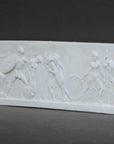2.75 Inches High x 10.125 Inches Wide x .5 Inches Deep
Upon arriving in London in 1811 from Scotland and seeing Lord Elgin's collection of Parthenon sculptures, John Henning (1771-1851) asked Lord Elgin for permission to study them. The Scottish sculptor was one of the first artists to do so. Henning drew the reliefs and then sculpted miniatures of them in ivory but, disliking the outcome, instead carved negatives in slate from which plaster casts could be made. He spent 12 years drawing and sculpting the Parthenon and Phigalia (Bassae) friezes. His reproductions, at 1:20 scale, are extremely detailed copies of the original sculptures although at times he did take artistic license and sculpt missing elements. Henning's miniatures of the Parthenon friezes were offered for sale by the British Museum in boxed sets. Unfortunately, Henning could not copyright his detailed sculptures, and they were copied and sold by others.
The Phigalia frieze is from the Temple of Apollo Epicurius (or Epikourios). The Temple is located in Bassae, now a UNESCO World Heritage Site, in the Arcadian mountains in the Greek Peloponnese. The nearby people of Phigalia dedicated it to Apollo Epicurius, meaning "Apollo the helper." Possibly designed by Ictinus, one of the architects of the Parthenon, the Temple was built between 420 and 400 B.C.E. and is a masterpiece of architecture. The frieze inside the Temple was removed in 1812 and subsequently acquired by the British Museum.
Henning's reduction is composed of the scenes from two nonadjacent panels from the east side of the frieze. The east and south sides depicted the battle between the Greeks and the Amazons. Starting from the left, a Greek attacks an Amazon on the preceding panel. An Amazon and Greek fight next to him. Another Amazon is shown falling to the ground. The right half of the reduction is from another panel. Again starting from the left, a Greek carries a comrade on his back off the battlefield. An Amazon stands with her shield and beside her another Greek is assisting a wounded soldier off the battlefield.
Artist: John Henning
Museum: Examples of Henning's casts and molds are in the British Museum, London, and Paisley Museum, Paisley, Scotland
Origin: Temple of Apollo Epicurius at Bassae, Arcadia, Greek Peloponnese
Time Period: Modern, early 19th century
1911 Catalog ID # - 8050 Slab XLI
Sources:
"The Bassai Sculptures/The Phigaleian Frieze." Museum number 1815,1020.13. The British Museum, http://www.britishmuseum.org/research/collection_online/collection_object_details.aspx?objectId=461750&partId=1&searchText=Epikourios&page=1.
"The Bassai Sculptures/The Phigaleian Frieze." Museum number 1815,1020.14. The British Museum, http://www.britishmuseum.org/research/collection_online/collection_object_details.aspx?objectId=461757&partId=1&searchText=phigaleian&page=1.
"John Henning 1771-1851. Sculptor." National Galleries of Scotland, https://www.nationalgalleries.org/art-and-artists/2719/john-henning-1771-1851-sculptor.
"John Henning: Reproducing Antiquity." Classics & Class, http://www.classicsandclass.info/product/192/.
"John Henning's moulds and casts of the Parthenon sculptures." The Trustees of the British Museum, London. The British Museum Images, https://www.bmimages.com/preview.asp?image=00032937001.
"Marble block from the frieze of the Temple of Apollo Epikourios." Google Arts & Culture, https://artsandculture.google.com/asset/marble-block-from-the-frieze-of-the-temple-of-apollo-epikourios/qQHSfGM6xEFbCQ.
"Temple of Apollo Epicurius at Bassae." United Nations. UNESCO World Heritage Center, 1992-2018, https://whc.unesco.org/en/list/392.
Vikatou, Olympia. "Bassae: History." Ministry of Culture and Sports, http://odysseus.culture.gr/h/3/eh351.jsp?obj_id=6664.
2.75 Inches High x 10.125 Inches Wide x .5 Inches Deep
Upon arriving in London in 1811 from Scotland and seeing Lord Elgin's collection of Parthenon sculptures, John Henning (1771-1851) asked Lord Elgin for permission to study them. The Scottish sculptor was one of the first artists to do so. Henning drew the reliefs and then sculpted miniatures of them in ivory but, disliking the outcome, instead carved negatives in slate from which plaster casts could be made. He spent 12 years drawing and sculpting the Parthenon and Phigalia (Bassae) friezes. His reproductions, at 1:20 scale, are extremely detailed copies of the original sculptures although at times he did take artistic



